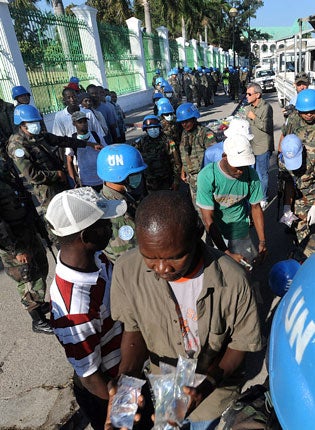Small aid agencies have a vital role

Your support helps us to tell the story
From reproductive rights to climate change to Big Tech, The Independent is on the ground when the story is developing. Whether it's investigating the financials of Elon Musk's pro-Trump PAC or producing our latest documentary, 'The A Word', which shines a light on the American women fighting for reproductive rights, we know how important it is to parse out the facts from the messaging.
At such a critical moment in US history, we need reporters on the ground. Your donation allows us to keep sending journalists to speak to both sides of the story.
The Independent is trusted by Americans across the entire political spectrum. And unlike many other quality news outlets, we choose not to lock Americans out of our reporting and analysis with paywalls. We believe quality journalism should be available to everyone, paid for by those who can afford it.
Your support makes all the difference.Confronted by this colossal disaster, with all the Oxfams and Christian Aids of this world stampeding to get onto the ground, how does a small relief agency set about making itself useful?
It's a challenge Paddy Maguinness is familiar with. As deputy chief executive until two years ago of Concern Worldwide, Ireland's biggest relief agency, he has been at the sharp end of bringing humanitarian relief into disaster zones all over the world. He knows what it takes to negotiate the chaos of the first days of a major disaster so that, two or three years down the line, the organisation and all those who made donations can look back on their work with satisfaction.
Yesterday he was preparing to fly into Haiti to help the Irish mobile phone company Digicel, which provides a basic but vital cellphone service to millions of poor Haitians, get up and running again. Speaking from Kingston, Jamaica he said, "I don't need to go to Haiti to know what it's like, I can smell it from here. Those kinds of scenes are emblazoned on my brain." As well as restoring mobile services, Digicel plans to resume building houses for some of the millions made homeless by the quake – work it was already doing before the disaster struck.
The key for small agencies, he said, is to "Start very small. Employ and engage as many local people as you can, so you know from their responses that what you are doing is useful. But look over their shoulders, too, because the people who turn up to offer advice, and to be helped, may not be the people who are most in need. Coordinate with other agencies to make sure you are not duplicating tasks being done by others."
In Haiti the demands of the immediate rescue and relief effort stare the world in the face, but an organisation that wants to make itself useful has to think long-term, he says. "My advice in Haiti is, don't run ramstam into anything – you'll hit a wall and do the wrong thing. I'm saying to Digicel, use your business brains. I don't like to talk about this disaster as an opportunity, but Port-au-Prince was a ramshackle city at the best of times. You don't want to let it go back up again the way it was."
Join our commenting forum
Join thought-provoking conversations, follow other Independent readers and see their replies
Comments